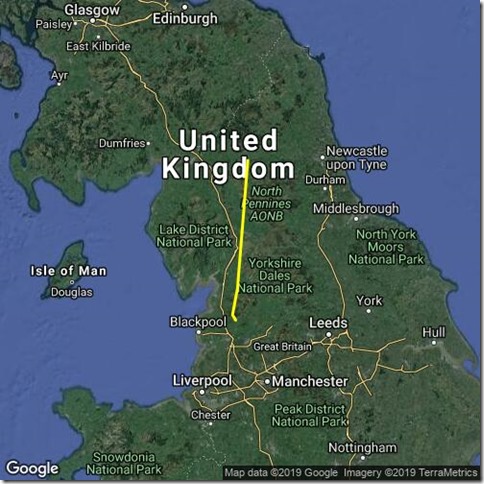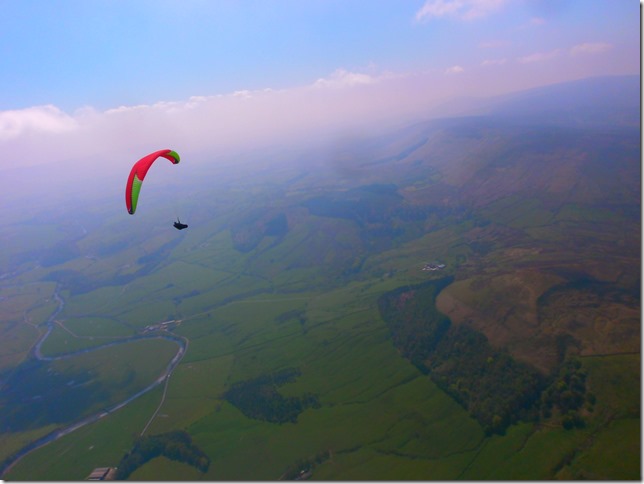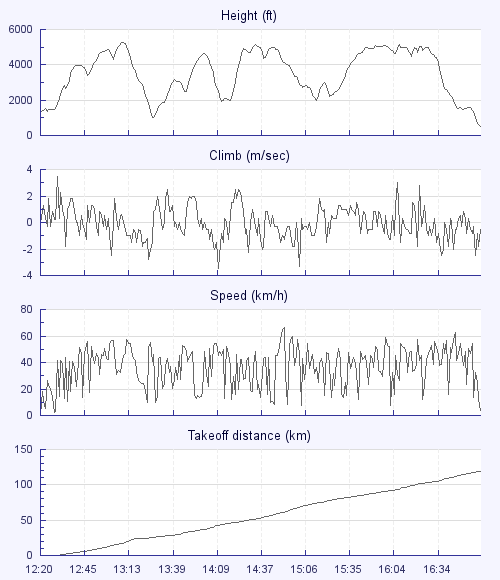I had a really nice flight on the Thursday afternoon, floating around at cloudbase out the front of Pendle so had accepted Friday would be a work day. Fortunately, when I got to work I had a quick check of the weather forecasts.
RASP was looking excellent, boundary layer depth over 5000 feet, light southerly, a 4 star day for what would be the track north from Parlick. It was too good to miss, so a frantic 3 hours followed by a quick exit from work saw me on Parlick for 12pm.
As I walked up I was watching John Oliver climbing out in what was obviously a really nice thermal. A couple of the local pilots were sat on the top, they were able to confirm that Paul Winterbottom had left the hill earlier but they thought conditions were a bit strong. It didn't feel too bad to me so I quickly got ready and launched. A few exploratory pushes out towards where the clouds were gave bits of lift but nothing good enough to tempt me away from the hill. A radio message from one of the guys on the hill that it was blowing strongly up past take off brought me back and as I pushed out from take off over the big gulley that runs up the south face of Parlick I got into a super 2m/s climb all the way to 4000 feet.
 That was me committed to leaving the hill and as the lift slowed I glided over to get under the big cloud that was tracking slightly west of me. This also worked and I was able to stay with this cloud over the 1st moorland section although I didn't make it to cloudbase.
That was me committed to leaving the hill and as the lift slowed I glided over to get under the big cloud that was tracking slightly west of me. This also worked and I was able to stay with this cloud over the 1st moorland section although I didn't make it to cloudbase.
JO radioed to say he was down at Abbeystead in what he thought was sea breeze, with forward speed of 5K when he landed. PW also came on the radio to say he was over Killington Lake and that the wind strength was OK all the way to there.
Both messages were a help – as I glided towards the next cloud I tracked towards the east side of it to try and stay away from the sea breeze, and knowing that the wind shouldn't be a problem for the next 40K took one worry away.
Good lift under the next cloud took me all the way to cloudbase at 5000 feet, and this made the crossing of Tarnbrook and Mallowdale fells, often tricky with a long walk if you go down, relatively easy. The sea breeze was noticeable as clouds were forming below me on the western side and it was bumpy as I negotiated what seemed to be an area of convergence.
The lift died so I set off on a glide to a cloud to my north. On route it started to dissipate with holes showing in the cloud shadow. I decided to head back into wind to try and find lift, partly as the cloud I had left still looked good. This didn't work and I ended up at 1,000 feet, 12 minutes after being at 5,000 feet.
At this point I realised that rather than looking at the clouds I should be looking at the ground features. Off to my right, among all the green fields were two brown dry looking graded fields with one of them on a slight slope. They worked for a broken climb to 3000 feet and then a short glide to the edge of Kirby Lonsdale and a better climb back up to 5,000 feet.
Another long glide and this time I used both the ground features (nice dry cut field with a tree line at the downwind side) plus clouds just downwind to find a good climb back up to 5,000 feet.
It was tempting to head into the Lakes following a line of cloud that was forming along the windward side of the hills but I decided the better option was to carry on along the direction of the wind, especially as my Oudie was telling me that the wind was up to 26kph so my drift was good.
This was new territory for me, I have never managed to fly past the eastern side of the Howgills and for the first time ever I was flying with a pee tube. As I was high over open countryside I decided to give the pee tube a go, leg out of the harness and - nothing. My brain couldn't persuade my body that it was going to work without me ending up wet and smelly!
The next 15k to Tebay was very pleasant, flying in towards the middle of the cloud to top up and then back out to the sink at the east side of the cloud, down 200 foot or so then repeat, drifting along at a decent speed. The views were fantastic with the Lake District on one side and the Howgills and then the Yorkshire Dales on the other.
North of Tebay I had to work hard for about 20k before another great climb back to cloudbase which was now about 5,300feet.
The next 20k were incredible, again drifting with the cloud I flew the length of Cross Fell at over 5,000 feet, watching 5 sailplanes that were flying the ridges about 4,000 feet below me. The first half of this section was along the eastern side of the cloud, the sun by now was off to the west. It was relatively smooth with gentle climbs and transitions to the sink. One of the highlights was watching the distance to take off pass the 100k. Another highlight was managing to use to the pee tube for the first time as the pressure overcame the doubt. I was glad there were no spectators as it definitely can't look cool flying along shaking your leg to try and get rid of the drips!
The lift started to slow so I transitioned across to the sunny side. What a difference, stronger lift and sharp edges, this wasn't as comfortable. I also had to decide which way to head, stay with the direction of the drift even though it looked blue ahead or try and work crosswind into the flats towards Carlisle.
With hindsight I may have made the wrong choice due partly to having the display on the Oudie at too small a scale, I stayed with the drift without realising it was taking me straight towards the Spadeadam danger area, which is huge! By the time I spotted it on the map I was too close to fly round and it's too big and high to fly over. This meant that there was no way I could achieve one of my ambitions, to fly to Scotland from Parlick.
The flight ended by flying past the moors where I had a long walk out earlier this year after a flight from the Lake District, to land on the outskirts of Haltwhistle for 121K. A slightly windy landing, short walk, lift from a chap I had asked directions from and I was at the train station.
Another lesson from the flight, removing pee tube attachments need more privacy than the middle of a field. For anyone who saw me after I visited the loo on the Virgin train from Carlisle, the tears weren't emotion, they were pain, after discovering that the glue on the sheath sticks even better to hair than skin!
The main lesson for me from the day was how lucky we are nowadays to have easy access to such good weather forecasting. RASP is especially good and learning to interpret it really can pay dividends. For me the town and city forecast to give detailed analysis of the local conditions, combined with the traditional maps to show the likely conditions on a possible flight path, give a great indication of what might be possible and also clues as to what the best track to follow might be.
Now just have to wait for the right conditions and opportunity to try and make that flight to Scotland!
 2012 saw the Pennines at the TOP of the UK XC club league, again, with a dramatic 3248 points!
2012 saw the Pennines at the TOP of the UK XC club league, again, with a dramatic 3248 points!